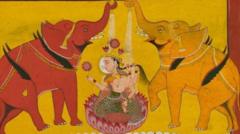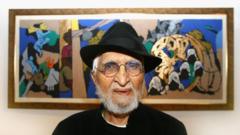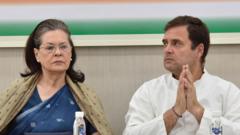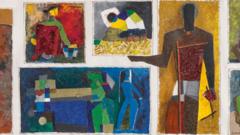In a decision that's igniting debate on artistic freedom and religious sentiments, the Delhi court has ordered the seizure of two paintings by the late artist MF Husain.
Delhi Court Orders Seizure of Controversial MF Husain Paintings
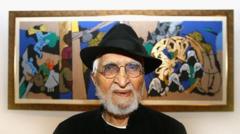
Delhi Court Orders Seizure of Controversial MF Husain Paintings
A Delhi court has directed police to take possession of MF Husain's artworks deemed "offensive."
In a significant ruling, a Delhi court has mandated the seizure of two paintings created by acclaimed artist MF Husain, known for his provocative depictions of Hindu deities. The court’s order followed a complaint that argued the artwork, displayed at the Delhi Art Gallery (DAG), was offensive and had the potential to hurt religious feelings.
The controversial pieces were part of an ongoing exhibition titled "Husain: The Timeless Modernist," which showcases over 100 works and runs until December 14. The legal complaint was brought forth by a lawyer named Amita Sachdeva, who claimed to have photographed the paintings and subsequently filed a police report after researching previous grievances against Husain's work. Despite a visit by the investigating officer to the gallery, she alleged that the paintings had already been taken down, with officials denying they were displayed at all.
The seized paintings reportedly depicted Hindu deities Ganesha and Hanuman alongside nude figures. Following the court's involvement, the judge noted that police reviewed CCTV footage from the gallery and highlighted that the exhibition’s purpose was to celebrate Husain's artistic legacy in a private space.
MF Husain, a renowned figure in Indian art often referred to as the "Picasso of India," has experienced ongoing controversy throughout his career due to his multifaceted exploration of nudity and divinity in his work. His legacy is marked by accusations ranging from obscenity to offending religious sentiments, driving him into self-exile in London in 2006 following public backlash.
Despite the uproar, Indian courts, including the Supreme Court, have historically defended Husain's right to artistic expression, asserting that nudity is part of India’s cultural heritage and dismissing calls for censorship. This latest case is reigniting discussions about the balance between artistic expression and religious sensitivities within India's contemporary socio-political landscape.
As the DAG navigates these legal pressures, it remains to be seen how the seizure will impact the broader discourse on freedom of speech and artistic expression in the country.
The controversial pieces were part of an ongoing exhibition titled "Husain: The Timeless Modernist," which showcases over 100 works and runs until December 14. The legal complaint was brought forth by a lawyer named Amita Sachdeva, who claimed to have photographed the paintings and subsequently filed a police report after researching previous grievances against Husain's work. Despite a visit by the investigating officer to the gallery, she alleged that the paintings had already been taken down, with officials denying they were displayed at all.
The seized paintings reportedly depicted Hindu deities Ganesha and Hanuman alongside nude figures. Following the court's involvement, the judge noted that police reviewed CCTV footage from the gallery and highlighted that the exhibition’s purpose was to celebrate Husain's artistic legacy in a private space.
MF Husain, a renowned figure in Indian art often referred to as the "Picasso of India," has experienced ongoing controversy throughout his career due to his multifaceted exploration of nudity and divinity in his work. His legacy is marked by accusations ranging from obscenity to offending religious sentiments, driving him into self-exile in London in 2006 following public backlash.
Despite the uproar, Indian courts, including the Supreme Court, have historically defended Husain's right to artistic expression, asserting that nudity is part of India’s cultural heritage and dismissing calls for censorship. This latest case is reigniting discussions about the balance between artistic expression and religious sensitivities within India's contemporary socio-political landscape.
As the DAG navigates these legal pressures, it remains to be seen how the seizure will impact the broader discourse on freedom of speech and artistic expression in the country.





